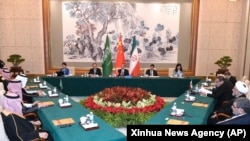Middle Eastern analysts are divided on the news of the surprise diplomatic rapprochement between Saudi Arabia and Iran brokered by China. Some view the development as potentially positive for Lebanon and perhaps Yemen, where Tehran exerts great influence, but other observers are cautious, with some speculating that Iran is simply trying to alleviate the current pressure it is facing.
Generally, Middle East analysts welcome the news of the resumption of diplomatic ties between volatile rivals Saudi Arabia and Iran in the hopes that it will lessen regional tensions and increase stability.
Maha Yahya, who directs the Carnegie Middle East Center in Beirut, says the deal’s timing was opportune, especially for Iran, “given the collapsing economic situation there and mounting international pressure, especially after the failure to revive the nuclear deal and Iranian progress in enriching uranium. This was all the more significant in that the country has been facing months of domestic protests.”
Lebanese analyst Dania Koleilat Khatib told VOA that both Iran and Saudi Arabia could gain from stability, if the deal takes hold. Khatib is the president of the Beirut-based Research Center for Cooperation and Peace Building.
“The Iranians to a certain extent will hold on to it because they don’t have any other choice," she said. "They are under great pressure. There’s pressure inside, there’s pressure outside. There is no hope for the revival of the JCPOA (the Iran nuclear deal), so the best thing for them is to make peace with their neighbors. All the instability coming from Iran, Hezbollah, the Houthis, if there is an agreement with Iran and Iran follows through, it will decrease the instability in the region. This is something Saudi needs for the Vision 2030.”
Vision 2030 is Saudi Arabia’s ambitious economic reform plan aiming to reduce its dependence on oil production by diversifying into industry, logistics, tourism and other sectors.
Khatib says both Saudi Arabia and Iran may be willing to make concessions and agree to a compromise presidential candidate in Lebanon as a result of the deal. Yet others are less optimist.
Analysts say it could also speed up peace talks between Saudi Arabia and the Iran-backed Houthi rebels in Yemen, who have claimed drone attacks on Saudi oil facilities.
But Dina Esfandiary of the International Crisis Group told the French news agency, AFP, that if it’s just a Saudi-Houthi deal, there will be “an issue inside Yemen with the grievances of various other parties that aren’t being addressed," including the main separatist faction, the Southern Transitional Council.
Farhad Rezaei, a senior fellow at the Philos Project New York, is skeptical about Iranian hardliners truly wanting to normalize ties with Saudi Arabia, saying in a tweet that “once the pressure subsides, they will likely revert to their previous hostile stance given their religious and geopolitical conflicts.” He points to previous failed attempts by the custodians of Sunni and Shiite Islam to reconcile.
Still, Faisal Abbas, who is the editor-in-chief of the Saudi Arab News, says “it would have been irresponsible for the Saudi leadership not to give peace a chance.” But he also points out that it is “early days.” “We cannot expect four decades of Iranian hostility and investment in undermining regional security to disappear overnight,” he says.





